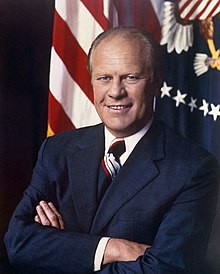📖 Presidential Profile
Comprehensive overview of leadership, policies, and historical significance
📋 Biography & Political Journey
Early Life and Congressional Career
Gerald Rudolph Ford was born Leslie Lynch King Jr. on July 14, 1913, in Omaha, Nebraska, but was raised in Grand Rapids, Michigan, by his mother and stepfather, who gave him his name. Ford was an accomplished athlete, playing center and linebacker for the University of Michigan football team, which won national championships in 1932 and 1933. After graduating from Yale Law School in 1941, he served in the Navy during World War II, seeing combat in the Pacific Theater. Ford was elected to Congress in 1948 and served 25 years in the House of Representatives, including eight years as House Minority Leader.
Vice Presidency and Succession to the Presidency
Ford became Vice President in December 1973 under the 25th Amendment after Spiro Agnew resigned in scandal, making him the first person to serve as Vice President without being elected to national office. When Richard Nixon resigned on August 9, 1974, Ford became President, famously declaring upon taking office, “I am acutely aware that you have not elected me as your President by your ballots, and so I ask you to confirm me as your President with your prayers.” He thus became the only person to serve as both Vice President and President without being elected to either office.
Healing the Nation and Economic Challenges
Ford’s primary goal as President was to heal the nation after the trauma of Watergate and Vietnam. He emphasized honesty and openness, holding regular press conferences and trying to restore trust in government. His administration faced significant economic challenges, including high inflation and unemployment, leading to the term “stagflation.” Ford launched the “Whip Inflation Now” (WIN) campaign, encouraging Americans to fight inflation through voluntary measures, though the program was largely unsuccessful and became a source of ridicule.
Nixon Pardon and Controversial Decisions
Ford’s most controversial decision was pardoning Richard Nixon on September 8, 1974, just a month after taking office, preventing any criminal prosecution of the former president. Ford explained the decision by saying the country needed to move forward and that “our long national nightmare is over,” but the pardon was deeply unpopular and likely cost him the 1976 election. Critics argued the pardon was part of a secret deal, though Ford consistently denied this. He also faced criticism for his handling of the Mayaguez incident in 1975 and the final fall of Saigon.
Physical Comedy and Endearing Moments
Despite being an accomplished athlete, Ford developed a reputation for physical clumsiness after several well-publicized stumbles and falls, including slipping down the steps of Air Force One and bumping his head on helicopter doors. Saturday Night Live comedian Chevy Chase’s portrayal of Ford as bumbling and accident-prone became iconic, though Ford took the jokes in good humor. Ford once said, “I know I’m a Ford, not a Lincoln,” showing his self-deprecating humor. He was also known for making his own English muffins for breakfast every morning and was an avid skier well into his later years, proving his athletic abilities despite the comedic portrayals.
Humor & Jokes
Ford's Pipe Smoking
Gerald Ford smoked a pipe, which was perfect because his presidency went up in smoke…
Read More →Greatest Wins
☀️ Government in the Sunshine Act
Ford signed landmark transparency legislation requiring open government meetings, significantly expanding public access to federal…
Read More →Epic Fails
🏛️ Refusal to Bail Out New York City
Ford's initial refusal to help financially troubled New York City sparked the infamous 'Ford to…
Read More →